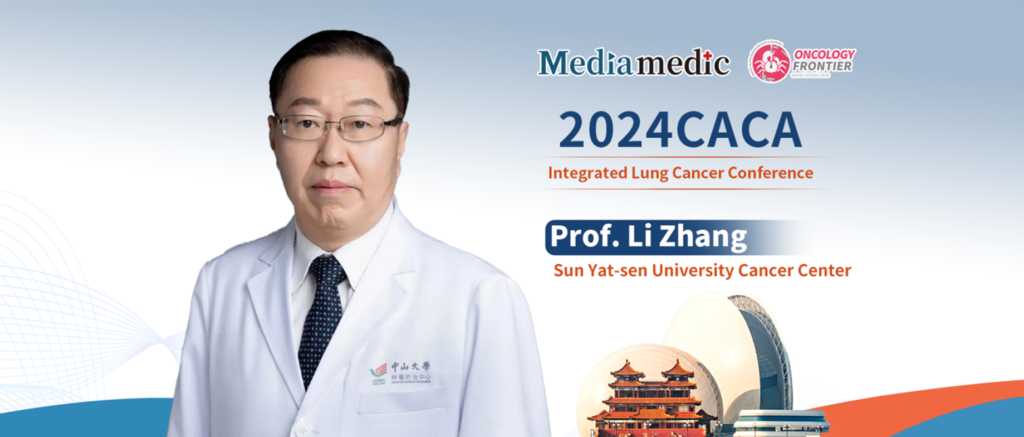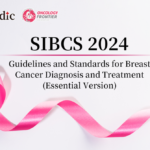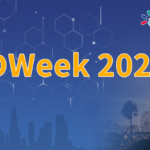
Editor’s Note: The 2024 CACA Integrated Lung Cancer Conference, organized by the Chinese Anti-Cancer Association and the CACA Lung Cancer Integration Committee, was held in Zhuhai from October 25 to 26. Under the theme “Gathering Strength and Leading the Future,” the conference brought together top experts in lung cancer to discuss key challenges and advancements. Oncology Frontier interviewed Prof. Li Zhang from Sun Yat-sen University Cancer Center, who shared insights on the clinical applications, development, and future prospects of antibody-drug conjugates (ADCs) in lung cancer treatment.Oncology Frontier: In your keynote speech, “ADC Therapy for NSCLC: Advantages and Challenges,” could you discuss the clinical advantages of ADCs for treating advanced NSCLC, as well as recent research developments?
Prof. Li Zhang: ADCs are a major research focus in oncology, especially for hematologic cancers and breast cancer, where multiple ADCs have been approved for clinical use. Earlier this month, China approved its first ADC targeting HER2 mutations in advanced NSCLC, trastuzumab deruxtecan, marking the beginning of ADC-based treatment for lung cancer in China.
An ADC combines a monoclonal antibody targeting specific tumor antigens with a cytotoxic agent linked via a stable linker. This structure combines the potent effects of traditional chemotherapy with the targeting specificity of antibody drugs, reducing off-target toxicity associated with cytotoxic agents. This design allows previously toxic agents to be clinically viable for tumor treatment when conjugated with antibodies. During the main conference, I covered ADC therapies for key targets in lung cancer, including HER2, Trop2, c-MET, EGFR, and HER3. I focused on the progress of Chinese-made ADCs, which we hope will soon benefit Chinese lung cancer patients and contribute to our cancer treatment efforts.
Oncology Frontier: Lung cancer treatment has entered an era of precision medicine, with growing attention on rare targets. Could you share any breakthroughs in using ADCs for treating rare targets in NSCLC?
Prof. Li Zhang: HER2 mutations are rare in lung cancer, with a prevalence of only 1-3%, but they are an important driver mutation. As mentioned, the approval of trastuzumab deruxtecan for HER2-mutant advanced NSCLC provides a new therapeutic option for patients with this mutation.
Other rare target ADCs are still in development, including domestic drugs such as Kelun-Biotech’s Trop2 ADC, SKB264, which includes eight cohorts in its clinical trials to evaluate efficacy against rare driver mutations like ALK fusion, KRAS mutation, RET fusion, ROS1 fusion, and MET exon 14 skipping mutation. The goal is to expand therapeutic options for NSCLC patients with rare mutations through ADC therapies.
Oncology Frontier: What challenges do ADC therapies face in NSCLC research and clinical practice, and what directions do you foresee for further exploration?
Prof. Li Zhang: ADC therapy for NSCLC faces several challenges. First, target selection is complex. As seen with two international multicenter clinical trials of Trop2 ADCs that recently failed, identifying optimal targets remains a critical challenge for future research.
Second, identifying appropriate patient populations is essential. Not all patients benefit from ADCs. I believe that one reason for the negative results in the two Trop2 ADC trials in lung cancer is the incorrect targeting of patient groups.
Third, toxicity management remains a concern, as ADCs can cause hematologic and target-specific toxicity. Determining the appropriate dosage is a key focus in current research.
Finally, combination therapy is a major area for exploration. Currently, combinations of chemotherapy, targeted therapy, and immunotherapy are widely used in lung cancer treatment. Future strategies for combining ADCs with targeted and immune therapies will be a significant clinical challenge. Several phase III clinical trials are underway, and I shared updates on these trials at this conference. We look forward to further data soon.
Prof. Li Zhang
- Second-Level Professor, Chief Physician of Internal Medicine
- Doctoral Supervisor, Chief Expert on Lung Cancer
- Vice Director, Lung Cancer Research Institute, Sun Yat-sen University
- Chairman, Tumor Rehabilitation and Palliative Care Committee, Chinese Anti-Cancer Association
- Vice Chairman, Clinical Trials Committee, Chinese Anti-Cancer Association
- Executive Director, Chinese Society of Clinical Oncology (CSCO)
- Incoming Chair, CSCO Immunotherapy Expert Committee
- Chairman, Tumor Chemotherapy Committee, Guangdong Anti-Cancer Association
- Vice Chairman, Lung Cancer Committee, Guangdong Anti-Cancer Association
- Lead Talent in Medicine, Guangdong Province


